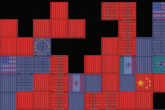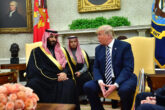April 23, 2020
The Geo-economic Fallout of COVID-19 for the Middle East
As the global novel coronavirus 2019 pandemic nears the end of its third month, the economic fallout from COVID-19 represents nothing less than the gravest crisis since the 1929 Great Depression. International stay-at-home orders led to a collapse in global demand, emptying city streets, shuttering factories, grounding air travel, and leaving most global shipping in stasis. Loretta Mester, the president of the U.S. Federal Reserve Bank of Cleveland, summed it up when she called it a “huge, unprecedented, negative shock”.
It will take years for the full impact of COVID-19 to be accurately assessed. When the rate of infection finally subsides, governments around the world will begin a slow process to restart the global economy. They are currently trying to plan it, though they lack any identifiable precedent for what is required. No one now seems quite sure if we will be able to return to the status quo ante, or, if in trying to get back to normal in fits and starts, we will see the trajectory of global growth forever altered.
Read the full article in The Cairo Review.
More from CNAS
-
Game Over?
The trade wargame suggests that sustained high tariffs could create leverage and urgency to spur action toward a productive restructuring of the international trade system....
By Emily Kilcrease & Geoffrey Gertz
-
Middle East Security / Energy, Economics & Security
Trump Inks $600 Bn Deal In Saudi Arabia | Musk, Blackrock CEO Flank Trump In Gulf VisitIn today's episode of India Global, U.S. President Donald Trump secured a $600 billion commitment from Saudi Arabia on Tuesday to invest in the United States. NDTV's Gaurie Dw...
By Daniel Silverberg
-
Energy, Economics & Security / Technology & National Security
Tariffs and Tech: An Uncertain RecipeHigher tariffs could prompt American cloud companies to shift more of their capital investments abroad....
By Pablo Chavez
-
Trump Tariffs: How Will U.S. Plans Reshape the Global Economy?
Donald Trump says he's already decided the tariffs he will impose on countries that export goods to America, including the United Kingdom. Channel 4 hears from Emily Kilcrease...
By Emily Kilcrease




